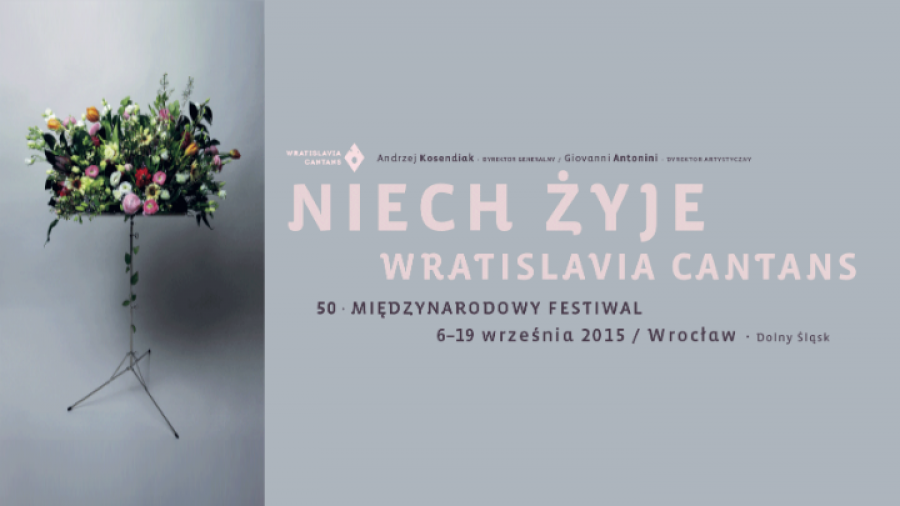This year Wratislavia Cantans celebrates two important events. The 50th edition of Wratislavia Cantans is a great anniversary. It makes us realize that the festival – which has been invariably one of the most important cultural events in Poland – was created in historic and cultural conditions so widely different from the present day. Wratislavia is about to step into the sixth decade of its history and into a new concert hall. It is the opening of the National Forum of Music that gives us another reason to celebrate. The completion of this state-of-the-art venue is an achievement of international dimension. The cutting edge solutions and facilities of the NFM will undoubtedly enrich the Wratislavia Cantans potential. The concurrence of these two joyful events has a symbolic meaning. The fifty exquisite editions of Wratislavia are the tradition and the basis for the festival’s future development symbolised by the forward-looking new concert venue.
We will celebrate the anniversary by reviving three concerts from the first Wratislavia whichtook place in 1966. The aim of these retrospective gigs is celebrationthrough enactment. It is also looking into what kinds of programmes wereinteresting for the audience fifty years ago. It is evident that music lovers at that time were very much interestedin contemporary music. What was their reception of the then avant-garde? What impression will those works make on us? I am very curious about the audience’s and my own reaction to the inauguration programme. The third concert of the first Wratislavia Cantans was Mozart’s Great Mass in C Minor which I will perform this year with Il Giardino Armonico and the NFM Choir. Since the beginning, a characteristic feature of Wratislavia Cantans was its focus on music for voice – from the 20th-century programme at the historical inauguration to Monteverdi, Mozart and Pergolesi on subsequent days. Likewise today, we programme the festival to show various faces of music, and the essence of Wratislavia is our rapture at the vast possibilities of the human voice. The third concert revived during the anniversary edition is a programme of Polish baroque,testifying to the importance of early music for Wratislavia Cantans. The revivals of the first Wratislavia repertoire are not exact reconstructions – today the
same pieces are performed in a different context.
We reminisce and look back in order to make progress. Wratislavia Cantans 2015 will show the potential of the National Forum of Music new venue. Works of Mahler will reveal the new and excellent possibilities of the festival. Three days after the opening of the National Forum of Music, Mahler’s brilliant Symphony No. 9 will be performed by the excellent Israel Philharmonic Orchestra under the baton of Zubin Mehta. The festival’s finale will be The Symphony of a Thousand, the phenomenal music for massive performance forces. The Rite of Spring by Stravinsky and Prometheus by Skriabin are also works requiring huge line-ups and flawless acoustics. We want to show the excellence of NFM for symphonic and choral-symphonic music.
One of the Wratislavia assets has always been the versatility of its programmes – quite a rarity among European festivals. Alongside monumental works, we offer concerts in intimate atmosphere, such as the evening with Enrico Onofri or recitals of Pierre Hantaï and Dmitry Sinkovsky. A concert is always a discovery. We all know Chopin’s Piano Concerto in F Minor, to be played by Maria João Pires, but we cannot foresee how the live performance will run. Attending a concert is taking part in the event in order to experience its unique atmosphere. In the Main Hall of the NFM we will listen to music with 1800 other listeners, the kind of togetherness we will never experience while listening to a CD.
Alexander’s Feast matches perfectly the festive atmosphere and will show the artistry of Wrocław Baroque Orchestra. Many a composer mused about the psychological qualities of two women – Dido & Cleopatra. The arias from their eponymous operas – both hugely popular and hardly known – will be performed by Il Giardino Armonico not in the chronological order, but in accordance with the plot lines we have drawn with Anna Prohaska. She is not only a singer, but also a researcher into music. It is my desire to open a series of concerts The Musical Treasures of Wrocław University Library introducing Wrocławians, and not only them, to the precious musical rarities stored in the capital of Lower Silesia. The series will open with a performance by Hana Blažíková in a 17th-century repertoire of Italian music popular in Wrocław centuries ago.
I hope our audience will be interested in concerts which, at first glance, seem a bit unconventional, I am sure the festival should also be a bit adventurous. Hence our idea to invite the avant-garde group eight blackbird, who will perform with Agata Zubel. Just as during the previous two editions, I am particular about presenting not only various repertoires, but also various approaches to music. Last year we hosted graindelavoix and Philippe Herreweghe – the two totally different visions of historical singing. This time, the invited mavericks of historical performance are Marcel Pérès with Ensemble Organum and the Choir of the Moscow Patriarchate presenting Orthodox liturgical music, surely an impressive and mesmerising experience.
On the eve of the 50th Wratislavia Cantans, enjoying the festival’s ‘birthday’, my thoughts run forward to next year’s edition as part of the European Capital of Culture Wrocław 2016. This particular year will be an opportunity to convince people who normally do not participate in cultural events that arts are important and necessary for our development. Stepping into the new concert hall, Wratislavia Cantans soars to a new and higher level of possibilities. We need to show the whole world that Wrocław is a place where important things happen.
Giovanni Antonini
Artistic Director
Andrzej Andrzej Markowski International Festival Wratislavia Cantans

